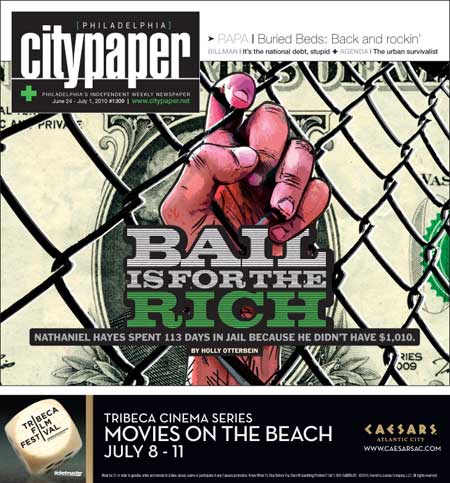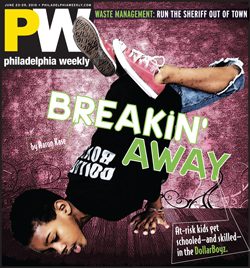 BY DAVE ALLEN Like time, news waits for no man. Keeping up with the funny papers has always been an all-day job, even in the pre-Internets era. These days, however, it’s a two-man job. That’s right, these days you need someone to do your reading for you, or risk falling hopelessly behind and, as a result, increasing your chances of dying lonely and somewhat bitter. That’s why every week PAPERBOY does your alt-weekly reading for you. We pore over those time-consuming cover stories and give you the takeaway, suss out the cover art, warn you off the ink-wasters and steer you towards the gooey center. Why? Because we love you!
BY DAVE ALLEN Like time, news waits for no man. Keeping up with the funny papers has always been an all-day job, even in the pre-Internets era. These days, however, it’s a two-man job. That’s right, these days you need someone to do your reading for you, or risk falling hopelessly behind and, as a result, increasing your chances of dying lonely and somewhat bitter. That’s why every week PAPERBOY does your alt-weekly reading for you. We pore over those time-consuming cover stories and give you the takeaway, suss out the cover art, warn you off the ink-wasters and steer you towards the gooey center. Why? Because we love you!
ON THE COVER
CP: Hard times and cold, hard cash: Holly Otterbein examines the city’s bail system and how it so often results the poor get the short end. She does the math and shows how the city doesn’t make any money off of people like Nathaniel Hayes, who spent over a hundred days in jail because he couldn’t cough up a little over $1,000. Something, it clears, doesn’t add up.
If cash bail doesn’t make the city money, what’s its purpose?
Its raison d’être is twofold, and beautifully simple: Guarantee that a defendant shows up for court, and protect the community from dangerous people.
But empirical research, dating back to the 1950s, suggests that it doesn’t work: Studies show that manipulating dollar amounts doesn’t affect the likelihood that a defendant will show up for trial or ensure the community’s safety. In part, this is because professional criminals often write off any bail sum as a cost to the company, and then skip court. Ever since those studies were conducted, scholars have pressed judges to halt, or at least limit, their use of bail and instead release defendants on their own recognizance or lock them up until trial if they’re too parlous — often to no avail.
So if monetary bail doesn’t work, what does?
There’s evidence that the answer lies in alternatives to pretrial detainment. Instead of setting monetary bail and thus holding a large amount of poor people, some judicial systems, including federal courts and Washington, D.C., opt to release defendants and provide them with various services: mental health care for the sick, substance-abuse treatment centers for the addicted and Breathalyzer tests for defendants who’ve been charged with a DUI, among other things.
She explores other local connections, like a professor from Temple who crafted bail guidelines that made sense and actual gained traction in the ‘70s, and makes it clear that the city is behind the curve on this: Washington D.C. and the federal government, among others, have dropped cash bail. I know you’re hurting for cash, Philly, but there’s gotta be another way.
PW: The wounds are still fresh from March’s “flash mob” incident — at least for this proximate-to-South-Street city-dweller — so I wasn’t sure where Aaron Kase was going with the lead to his story on the DollarBoyz. It could have been some incendiary race-baiting stuff — I remember seeing that back in March, too — but he ended up making me a believer in this thousands-strong youth movement based in North Phil, led by a guy known as Top Dollar. They dance, they perform, they’re on the streets not making a nuisance of themselves, and people still try to bring them down!
While the DollarBoyz strive to create opportunities, they find that not everyone is receptive to their presence. Young black males traveling in large groups—the Boyz often move in  a crew of 20 or more—attract the eye of law enforcement, and the group has felt the effects of increased police scrutiny since the rash of flash mobs a few months back. Top says that a crew of six is enough to attract negative attention.
a crew of 20 or more—attract the eye of law enforcement, and the group has felt the effects of increased police scrutiny since the rash of flash mobs a few months back. Top says that a crew of six is enough to attract negative attention.
“We walk to the store … as a big, large group, the cops will show up. They come out of their cars with their batons out, saying ‘Get the F out of here,’” he says.
“I tell the cops, ‘Yo, we a positive youth group,’” says Top, adding that the police generally back off until the next time they try to walk down the street.
The stereotypes extend to the party world, too. Although no one ever came out and said it, parties like those thrown by the DollarBoyz fit the description of the real targets of the promoter bill that passed through City Council this spring.
City Council’s trying to bring them down, too? These kids have the making of some anti-establishment heroes. God speed, Dollarboyz, and to Top Dollar: Try a new nickname — the current one kinda sounds like a gentleman’s club.
INSIDE THE BOOK
CP: I am now seeking corporate sponsors for my weekly column. Springsteen soundalikes: weak. Restaurant critic not too drunk to taste food at beer bar. National things: League, Lampoon, Debt.
PW: I’m against crappy music anyway, but this calls for a B-101 boycott. Sherriff, your days are numbered. Love the classic Swells quotes. Alma mater alert: Greetings, fellow Bison!
WINNER: In honor of the late Steven Wells and in his spirit of defiance against self-important horseshit the world over, PW gets the nod this week. He’s pissing off angels in heaven now.
